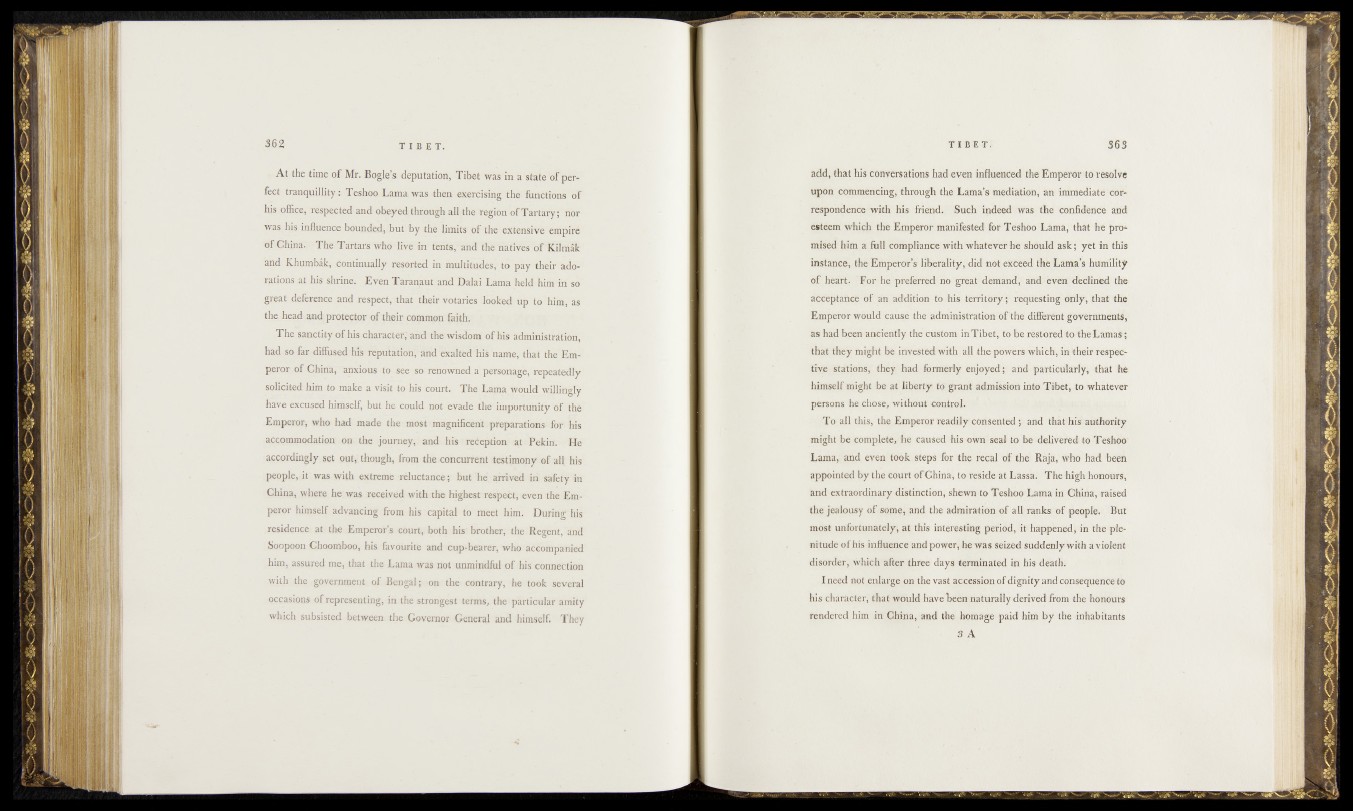
_____ _
562 T I B E T .
At the time of Mr. Bogle’s deputation, Tibet was in a state of perfect
tranquillity: Teshoo Lama, was then exercising the fonctions of
his office, respected and obeyed through all the region of Tartary; nor
was hjs influence bounded, but by the limits of the extensive empire
t>t China; The Tartars who five in tents, and ttà ïa tf^ 'ià r Kilmâk
'and Khumbâk, continually resorted in multitudes, to pay their adorations
at his shrine. Even Taranaut and Dalai Lama held him in so
great deference and respect, that their votaries looked up to him, as
the head and protector of their common faith.
The sanctity of his character,' and the wisdom of his administration,
had so far diffused his reputation, and exalted'his name, that the Em-*
peror of China, anxious to see so renowned a personage, repeatedly
solicited him to make a visit to his court. The Lama would willingly
have excused himself, but he could not evade the importunity of the
Emperor, who had made the most magnificent preparations- for his
accommodation on the journey, and his reception at Pekin’. He
accordingly set out, though, from the concurrent testimony of all. Ms
people, it was with extreme réluctance ; but he; arrived in safety in
China, where he was received witHithe highest respect, even the Emperor
himself advancing from his capital to meet him. During'his
residence at the Emperor’s court, both his brother, the Regent, and
Soopoon Choomboo, his, favourite and cup-bearer, who accompanied
him, assured me, that the Lama was riot unmindful of his connection
with the government of Bengal ; on: thé contrary, he took several
- occasions of representing, in the strongest terms, the particular amity
which subsisted between the Governor General and himself. They
T I BE T. S6S
add, that his conversations had-even influenced the Emperor to resolve
upon commencing, through the Lama’s mediation, an immediate correspondence
with his friend. Such indeed was the confidence and
esteem which tire Emperor manifested for Teshoo Lama, that he pro*
raised Mm a fall compliance with whatever hè should ask; yet in this
instance, the Emperor’s liberality, did not exceed the Lama’s humility
of heart. Fonhe preferred no great demand, and everi declined the
acceptance of an addition to his territory ; requesting only, that the
Emperor would cause the administration ofthe different governments,
as had been anciently the custom in Tibet, tb fee restored *to the Lamas 5
that they might be invested with all ihe powers which, ihtÉèlr respée^
five stations, they had formerly enjoyed ; and paTticrflady; that he
himself might be at liberty to grant admission into Tibet, to whatever
persons he chosei without control.
To all this, the Emperor readily consented; and that his' authority
might be complete, he caused his own seal to be <felivered to Teshoo
Lama, and even took steps for the recal of the Raja, who had hedh
appointed by the court ofChina, to reside at Lassa. The high honour#,
and extraordinary distinction, shfcWB'te Teshoo Lama In China, raised
the jealousy of some, and the admiration of all ranks of people. But
most unfortunately* at this interesting pe¥ibd, fe tokened* in the jfle*
nitude of his influence and power, he was seized suddenly with a violent
disorder, which after three days terminated in his death.
I need not enlarge oh the vast accession of dignity and consequence to
his diaracter, that would have been naturally derived from the honours
rendered him in China, and the Immagp paid him by the inhabitants
3 A